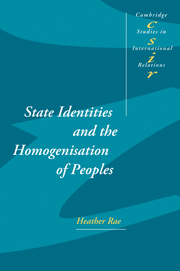Book contents
- Frontmatter
- Contents
- Preface
- Introduction
- 1 State formation and pathological homogenisation
- 2 The ‘other’ within Christian Europe: state-building in early modern Spain
- 3 State-building in early modern France: Louis XIV and the Huguenots
- 4 Pathological homogenisation and Turkish state-building: the Armenian genocide of 1915–1916
- 5 ‘Ethnic cleansing’ and the breakup of Yugoslavia
- 6 Evolving international norms
- 7 On the threshold: the Czech Republic and Macedonia
- Conclusion
- Bibliography
- Index
- CAMBRIDGE STUDIES IN INTERNATIONAL RELATIONS
Introduction
Published online by Cambridge University Press: 22 September 2009
- Frontmatter
- Contents
- Preface
- Introduction
- 1 State formation and pathological homogenisation
- 2 The ‘other’ within Christian Europe: state-building in early modern Spain
- 3 State-building in early modern France: Louis XIV and the Huguenots
- 4 Pathological homogenisation and Turkish state-building: the Armenian genocide of 1915–1916
- 5 ‘Ethnic cleansing’ and the breakup of Yugoslavia
- 6 Evolving international norms
- 7 On the threshold: the Czech Republic and Macedonia
- Conclusion
- Bibliography
- Index
- CAMBRIDGE STUDIES IN INTERNATIONAL RELATIONS
Summary
The history of the international system of states is replete with examples of states turning on their own citizens and the twentieth century was certainly no exception. Indeed, it was in the twentieth century, as states developed greater bureaucratic and military capacities, that the toll on their citizens rose to unprecedented numbers. This was despite the received wisdom in international relations scholarship that the state performs the cardinal function of providing security for its citizens in an anarchical international environment. Since the end of World War II the international community has developed clear norms of legitimate state behaviour towards citizens, yet in the last decade of the twentieth century the world witnessed brutality on an astounding scale, from Rwanda to the former Yugoslavia, in which segments of populations were targeted for expulsion or extermination.
The recurrence of such practices raises a number of key questions which animate this study: why have such practices been an enduring feature of international history? Why have elites used the resources of the state to persecute large sectors of their populations in ways, and to extents, that have ultimately proven detrimental to those states? Why has the international community failed to eradicate such practices, despite the development of norms which clearly prohibit them and despite the destabilising impact of such practices in terms of both refugee flows and regional conflicts?
- Type
- Chapter
- Information
- State Identities and the Homogenisation of Peoples , pp. 1 - 13Publisher: Cambridge University PressPrint publication year: 2002



